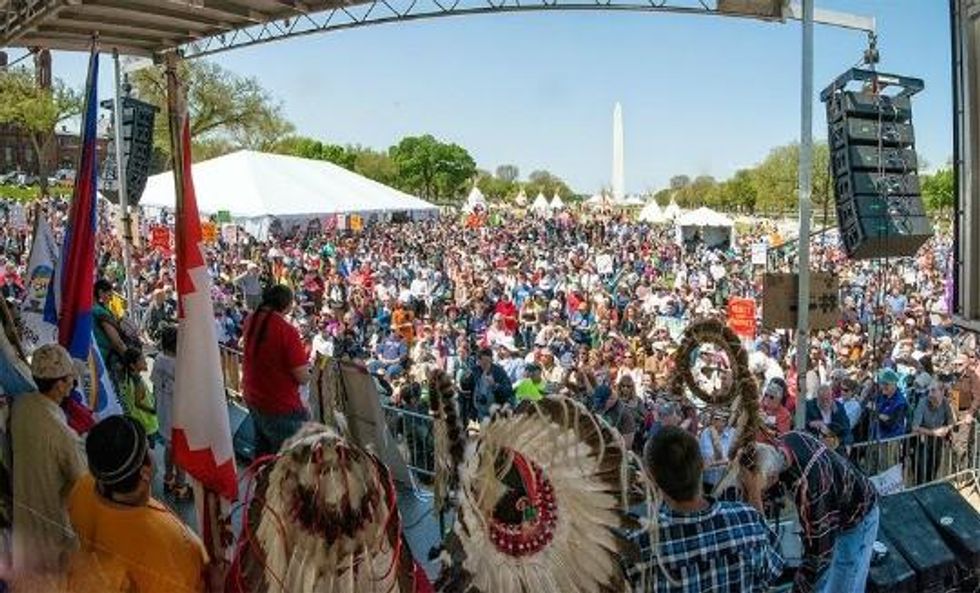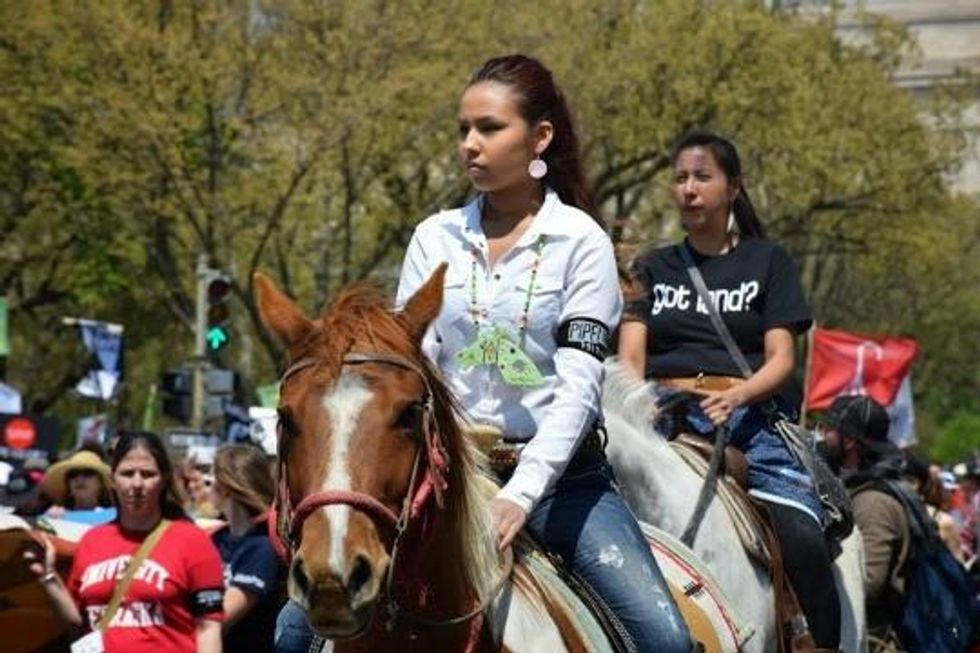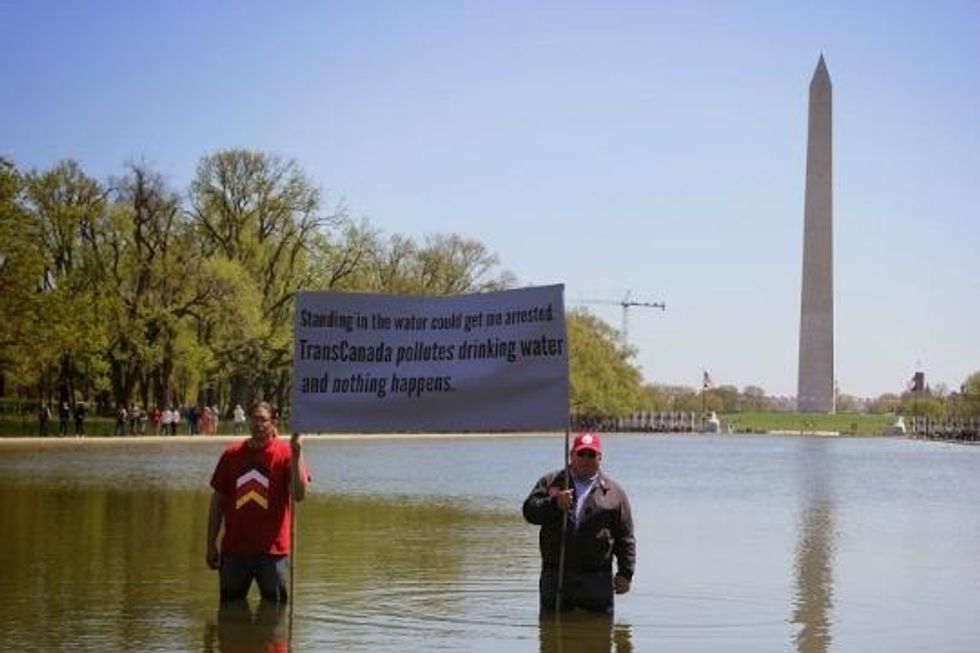

SUBSCRIBE TO OUR FREE NEWSLETTER
Daily news & progressive opinion—funded by the people, not the corporations—delivered straight to your inbox.
5
#000000
#FFFFFF
To donate by check, phone, or other method, see our More Ways to Give page.


Daily news & progressive opinion—funded by the people, not the corporations—delivered straight to your inbox.

"Reject and Protect" mobilization pictured Saturday, April 26 (Photo: Reject and Protect)
Native American tribes, farmers and ranchers, and thousands of their allies flooded the National Mall Saturday with a ceremonial procession calling for President Obama to reject the proposed Keystone XL tar sands pipeline.
In the biggest mobilization yet of a five-day protest encampment, participants rode horses, waved signs, and carried banners as they moved past tipis erected beside national monuments.
Saturday's action culminated with the delivery of a hand-painted tipi to the Smithsonian National Museum of the American Indian--a gift to President Obama symbolizing hope for protected land and clean water.
"Keystone XL is a death warrant for our people," said Oglala Sioux Tribal President Bryan Brewer, who helped lead the presentation of the tipi to the Smithsonian. "President Obama must reject this pipeline and protect our sacred land and water. The United States needs to respect our treaty rights and say no to Keystone XL."
Native American communities and ranchers have joined in the nation's capital in a historic "Cowboy Indian Alliance" to stop the proposed TransCanada Keystone XL pipeline that directly threatens their environment. Included among them are First Nations representatives, hailing from Alberta, Canada, where indigenous communities are invoking treaty rights in a bid to halt dangerous tar sands production on their land.
"As First Nations people, we abide by natural law, and there is nothing natural about a people dying from cancer and suffering from respiratory illnesses caused by tar sands production," said Crystal Lameman, a member of the Beaver Lake Cree Nation.
These frontlines communities gathered with supporters from around the world to oppose the northern leg of the Keystone XL pipeline, which, if approved, would pump 830,000 barrels of tar sands every day along a route that would extend from Alberta to Kansas. Canadian company TransCanada is pursuing a pipeline path that would cut through the land of the Lakota people, as stipulated in the Fort Laramie Treaty of 1868--a treaty that the U.S. government refuses to honor.
The southern portion of the pipeline, which extends from Oklahoma to Texas, began flowing with tar sands in January, despite fierce opposition from indigenous communities and others along its route.
One of the dirtiest fossil fuels in the world, tar sands production and shipment leads to a host of environmental and public health hazards, including spills, cancer, water contamination, deforestation, and climate change.
"The proposed pipeline is going to be coming through our backyard," said Robert Allpress, a rancher from North-Central Nebraska. "We live in an area that is very slide-prone and TransCanada has never checked that out."
The U.S. State Department recently announced it is delaying its final decision on whether to approve the northern portion of Keystone XL. In response, the Cowboy and Indian Alliance has vowed to step up its protests.
"This is just the beginning," said Jane Kleeb of Bold Nebraska. "The Cowboy and Indian Alliance will ride again."



Developments, reports, and commentary are being posted on Twitter.
Tweets about "#RejectAndProtect"
_____________________
Political revenge. Mass deportations. Project 2025. Unfathomable corruption. Attacks on Social Security, Medicare, and Medicaid. Pardons for insurrectionists. An all-out assault on democracy. Republicans in Congress are scrambling to give Trump broad new powers to strip the tax-exempt status of any nonprofit he doesn’t like by declaring it a “terrorist-supporting organization.” Trump has already begun filing lawsuits against news outlets that criticize him. At Common Dreams, we won’t back down, but we must get ready for whatever Trump and his thugs throw at us. As a people-powered nonprofit news outlet, we cover issues the corporate media never will, but we can only continue with our readers’ support. By donating today, please help us fight the dangers of a second Trump presidency. |
Native American tribes, farmers and ranchers, and thousands of their allies flooded the National Mall Saturday with a ceremonial procession calling for President Obama to reject the proposed Keystone XL tar sands pipeline.
In the biggest mobilization yet of a five-day protest encampment, participants rode horses, waved signs, and carried banners as they moved past tipis erected beside national monuments.
Saturday's action culminated with the delivery of a hand-painted tipi to the Smithsonian National Museum of the American Indian--a gift to President Obama symbolizing hope for protected land and clean water.
"Keystone XL is a death warrant for our people," said Oglala Sioux Tribal President Bryan Brewer, who helped lead the presentation of the tipi to the Smithsonian. "President Obama must reject this pipeline and protect our sacred land and water. The United States needs to respect our treaty rights and say no to Keystone XL."
Native American communities and ranchers have joined in the nation's capital in a historic "Cowboy Indian Alliance" to stop the proposed TransCanada Keystone XL pipeline that directly threatens their environment. Included among them are First Nations representatives, hailing from Alberta, Canada, where indigenous communities are invoking treaty rights in a bid to halt dangerous tar sands production on their land.
"As First Nations people, we abide by natural law, and there is nothing natural about a people dying from cancer and suffering from respiratory illnesses caused by tar sands production," said Crystal Lameman, a member of the Beaver Lake Cree Nation.
These frontlines communities gathered with supporters from around the world to oppose the northern leg of the Keystone XL pipeline, which, if approved, would pump 830,000 barrels of tar sands every day along a route that would extend from Alberta to Kansas. Canadian company TransCanada is pursuing a pipeline path that would cut through the land of the Lakota people, as stipulated in the Fort Laramie Treaty of 1868--a treaty that the U.S. government refuses to honor.
The southern portion of the pipeline, which extends from Oklahoma to Texas, began flowing with tar sands in January, despite fierce opposition from indigenous communities and others along its route.
One of the dirtiest fossil fuels in the world, tar sands production and shipment leads to a host of environmental and public health hazards, including spills, cancer, water contamination, deforestation, and climate change.
"The proposed pipeline is going to be coming through our backyard," said Robert Allpress, a rancher from North-Central Nebraska. "We live in an area that is very slide-prone and TransCanada has never checked that out."
The U.S. State Department recently announced it is delaying its final decision on whether to approve the northern portion of Keystone XL. In response, the Cowboy and Indian Alliance has vowed to step up its protests.
"This is just the beginning," said Jane Kleeb of Bold Nebraska. "The Cowboy and Indian Alliance will ride again."



Developments, reports, and commentary are being posted on Twitter.
Tweets about "#RejectAndProtect"
_____________________
Native American tribes, farmers and ranchers, and thousands of their allies flooded the National Mall Saturday with a ceremonial procession calling for President Obama to reject the proposed Keystone XL tar sands pipeline.
In the biggest mobilization yet of a five-day protest encampment, participants rode horses, waved signs, and carried banners as they moved past tipis erected beside national monuments.
Saturday's action culminated with the delivery of a hand-painted tipi to the Smithsonian National Museum of the American Indian--a gift to President Obama symbolizing hope for protected land and clean water.
"Keystone XL is a death warrant for our people," said Oglala Sioux Tribal President Bryan Brewer, who helped lead the presentation of the tipi to the Smithsonian. "President Obama must reject this pipeline and protect our sacred land and water. The United States needs to respect our treaty rights and say no to Keystone XL."
Native American communities and ranchers have joined in the nation's capital in a historic "Cowboy Indian Alliance" to stop the proposed TransCanada Keystone XL pipeline that directly threatens their environment. Included among them are First Nations representatives, hailing from Alberta, Canada, where indigenous communities are invoking treaty rights in a bid to halt dangerous tar sands production on their land.
"As First Nations people, we abide by natural law, and there is nothing natural about a people dying from cancer and suffering from respiratory illnesses caused by tar sands production," said Crystal Lameman, a member of the Beaver Lake Cree Nation.
These frontlines communities gathered with supporters from around the world to oppose the northern leg of the Keystone XL pipeline, which, if approved, would pump 830,000 barrels of tar sands every day along a route that would extend from Alberta to Kansas. Canadian company TransCanada is pursuing a pipeline path that would cut through the land of the Lakota people, as stipulated in the Fort Laramie Treaty of 1868--a treaty that the U.S. government refuses to honor.
The southern portion of the pipeline, which extends from Oklahoma to Texas, began flowing with tar sands in January, despite fierce opposition from indigenous communities and others along its route.
One of the dirtiest fossil fuels in the world, tar sands production and shipment leads to a host of environmental and public health hazards, including spills, cancer, water contamination, deforestation, and climate change.
"The proposed pipeline is going to be coming through our backyard," said Robert Allpress, a rancher from North-Central Nebraska. "We live in an area that is very slide-prone and TransCanada has never checked that out."
The U.S. State Department recently announced it is delaying its final decision on whether to approve the northern portion of Keystone XL. In response, the Cowboy and Indian Alliance has vowed to step up its protests.
"This is just the beginning," said Jane Kleeb of Bold Nebraska. "The Cowboy and Indian Alliance will ride again."



Developments, reports, and commentary are being posted on Twitter.
Tweets about "#RejectAndProtect"
_____________________